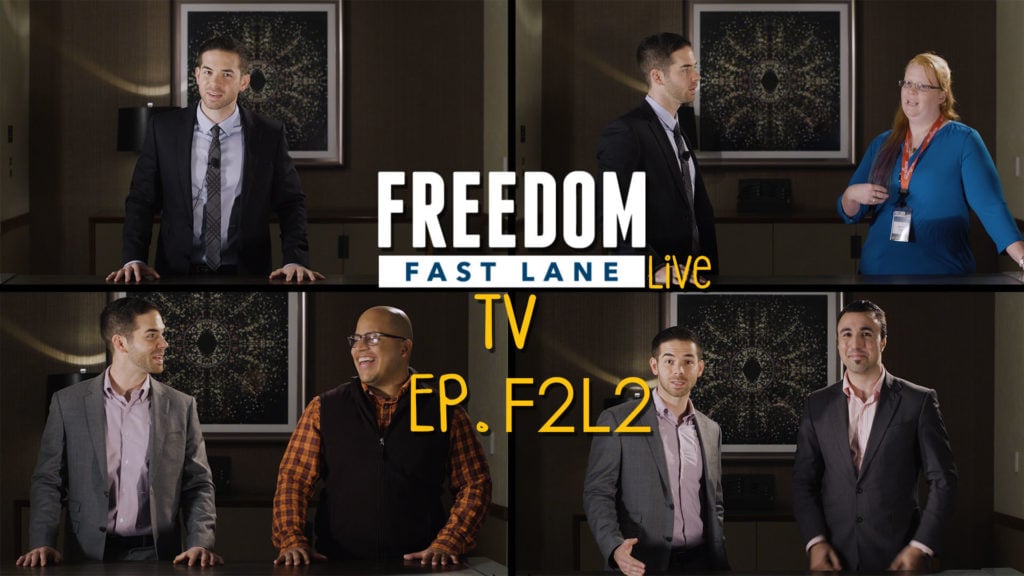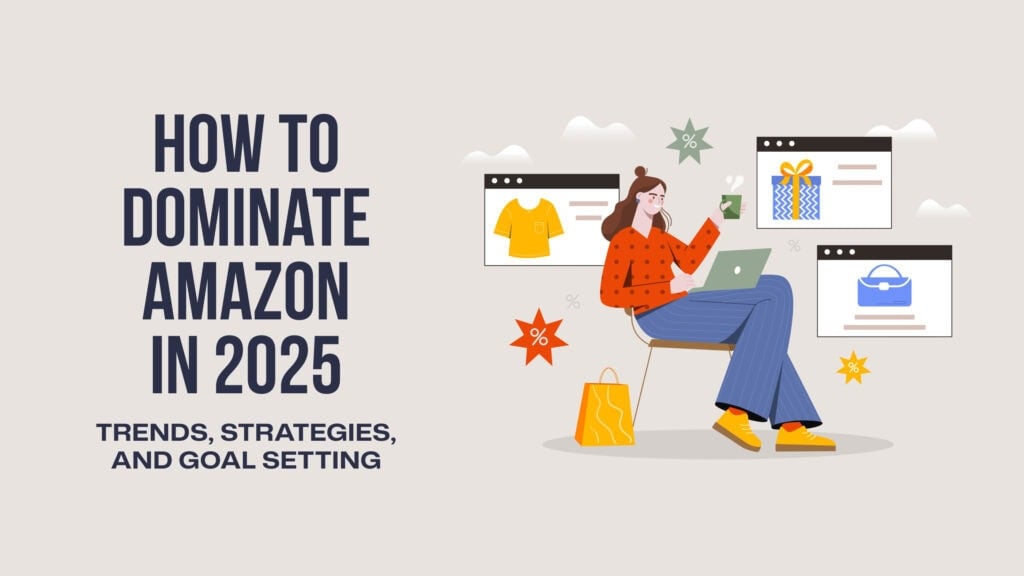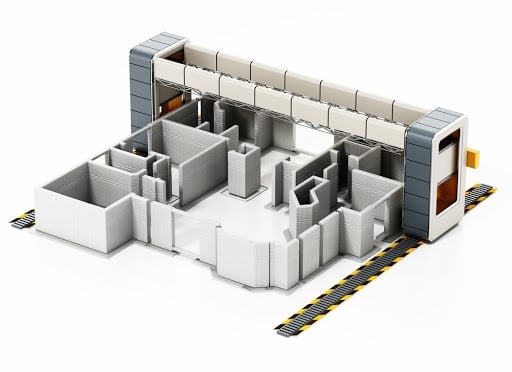This episode was filmed backstage at Freedom Fast Lane Live, and we look at some of our Tribe members' businesses.
DAY 1
I am so impressed because from what we can tell, the average person here runs a million-dollar business. Not like the top-tier people, but the average person in a room of 500 people runs a million-dollar business. I am so proud of our Tribe. I am so proud of what we have done here at Freedom Fast Lane. I wish we could manifest a Tribe member that we could talk to, use the law of, Amanda Dickson! The law of attraction works. Amanda, tell us a little bit about your business.
Amanda: I do have a physical product business on Amazon as of right now. It's in the baby space. My main product at this time is a head-shaping memory foam pillow.
Ryan: That sounds very scientific.
Amanda: Basically we had a son whose head flattened out, so when we had our daughter we realized we needed something to fix that problem.
Ryan: Alright. So how's business going right now and where are we looking to go?
Amanda: Well, in the first six months I have about $100,000 in revenue and profitable.
Ryan: Congratulations.
Amanda: I also have about $300,000 in a value of inventory to then sell, so that's great. But all of the thoughts with Freedom Fast Lane and coming here, part of the Tribe, I've really decided that what I want to do is more of a service-type business that I'm hoping that the product side can be a cash flow for that kind of breakthrough service.
Ryan: Now, you said a lot of the ideas you're getting from the Tribe and being here at Freedom Fast Lane are giving you the thought that you might have to pivot. So what specifically is making you think, "I should go out of a profitable business "and go into a different direction?"
Amanda: Well, I know that where I want to go is profitable also, so I don't feel that that's a distinction, and I don't know if that was your specific question. But the reason is I never connected here with the product. It was always the, who is my audience? How do I want to sell to that audience? What do they need?
Ryan: Does it bother you that you don't connect here with the product?
Amanda: The product side, yes, it did.
Ryan: Interesting. So from a business perspective, I would say keep doing what you're doing, because you are looking at the ideal trajectory of what most million-dollar businesses go through. $100,000 to $400,000 from those first six months, and then scaling to a million-dollar business after that 12 month trajectory completes. So you're right on path to have a really successful business that you can automate or then sell.
Amanda: Mhm.
Ryan: I don't see any reason why you couldn't have a consulting side of it also be the cash flow that funds out inventory and the other things that you put into your business. But if you just don't like doing it, if you just hate it, if it's preventing you from doing what you want, you can cut it. But listen, all entrepreneurs think that there is grass that is greener on the other side. They all think it's going to be better if they did this or better if they did that. So from a business perspective, I'd say keep doing what you're doing unless it's causing you unhappiness.
Amanda: Thank you.
Ryan: No, give me that other thought.
Amanda: Um, well, I am still full-time employed in my job because I knew that freedom was what I wanted, and I knew that the, kind of... I did the research on this whole Amazon business thing and your teachings were one of the main reasons why I went this way. And so I just wanted out of that job and wanted that freedom, and that's why I went to the product side. Now, it's not that I don't like it, it's not that it's not good, it's that I want true freedom, and that true freedom is going to come through helping people and changing things and making an impact.
Ryan: So this would be my recommendation. Keep building the business until you're free of the job. That's freedom number one.
Amanda: Right.
Ryan: Once you're free of the job, because the business is growing so much, you might wake up and say, "Holy crap, I run a million dollar business "or a multi-million dollar business, "and I don't have to clock into a job anymore. "I love doing this." Make the decision then if you're going to go into a different route, but don't make it until the first goal of quitting the job is already complete.
Amanda: That's kind of the question that I guess I had in my head but didn't know.
Ryan: Good work, Amanda.
Amanda: Thank you.
Ryan: I'm proud of you.
DAY 2:
Holy crap, I'm in new clothes. How did that happen? Magic of television. Hey, it's day two of Freedom Fast Lane Live. Just walked off stage with John Mackey. He gave an excellent keynote, and my favorite part, probably my favorite part of the conference so far was when John backed up the fact that the world is getting better because of capitalism with numbers and figures. And the best quote of the two days so far, he said, "You're right. "The middle class is getting squeezed. "And guess where they're going? "They're getting rich." So all of this nonsense about the rich getting richer and the poor getting poorer, is not really happening in real dollars. People are getting better every year because of capitalism.
Speaking of capitalism, I wish there was a way, yesterday we were so good at manifesting things. Could we manifest another Tribe member and go through their business and talk about, hey, the law of attraction continues to work! Now, this is creepy. I'm afraid people are going to think we're twins.
Jose: I'm sure.
Ryan: We look exactly alike. Introduce yourself and talk about your business.
Jose: I'm Jose Feliz. I'm the founder of Kavana Supplements. I'm from New York City and I have a question for you.
Ryan: Oh, well, you're in the right place, my friend.
Jose: So, a few months ago, when you went to New York, I was one of those--
Ryan: First of all, I want to say, we ran into each other at a New York bar when the Cleveland Indians were in the World Series. I couldn't make it to the game. I was stuck in New York City. 12,000 Indians fans in one bar. It was awesome.
Jose: I didn't know that that many Indians fans lived in New York, but...
Ryan: Oh yeah, go Tribe.
Jose: They do. I was affected by the Amazon changes. I didn't listen to you earlier this year.
Ryan: Oh, that never ends well.
Jose: Well, I didn't listen to you completely.
Ryan: Never ends well.
Jose: Until I was transitioning from the not-too-great strategy of review clubs earlier in the year.
Ryan: Okay, yeah.
Jose: And so I was affected by it. My product, it was a product I strongly believe in. After the changes came I went from 4 1/2 stars to 3 1/2.
Ryan: Okay, it's a big jump.
Jose: It was, and I went from 200 reviews to about a whopping 35.
Ryan: Oh, okay.
Jose: And I only have two products, and this is my main product that was selling the best.
Ryan: Okay, so would you talk a little about what your sales were before and what they are now?
Jose: Oh, so my sales were about $15,000 a month, and my sales now are $5,000 a month.
Ryan: Okay, so we have some work to do.
Jose: A lot.
Ryan: So when you say that you believe in this product, what is it that you believe in? What does it do for the customer?
Jose: So it's a sedative, and I have a ton of verified reviews. I've been working my way back up. I went from 35 a month to 66 now.
Ryan: Great.
Jose: I've been really hustling for these last 30 reviews.
Ryan: Are you first sedating people and then asking them for the review?
Jose: Yes, I am.
Ryan: Okay, alright, so how are you getting the reviews right now?
Jose: So, merch B has been tremendous, and I'm not even plugging it. It really has been great. And I've been getting tons of emails from my customers, and tons of people who like it. I kinda realized that I probably shouldn't have used review groups to start out with. I was using other software before, but the follow-up was really weak.
Ryan: Okay, cool, so problem diagnosed, you were using review groups. There was nothing wrong with review groups. It was totally cool, and within terms of service until they made the change. Now they're not allowed, and you haven't yet found a way to plug the gap from going from 3 1/2 stars to back to 4 1/2 stars.
Jose: Yeah.
Ryan: Here's the good news though. The fact that you've only got 35 reviews is going to be a lot easier to recover from than the guy who's got 500 reviews and has 3 1/2 stars.
Jose: So I'm up to four stars.
Ryan: Great, so have you seen a sales bump since you went from 3 1/2 to four?
Jose: Yes, I did.
Ryan: Alright, great, so we're heading in the right direction. My suggestion is that we need to be able to crank up the number of sales that were driving from Pay Per Click, from launches, from lists, from advertising, from anything that we have, YouTube channels, podcasts, however you, you're back in the grind. So you've gotta be able to grease those wheels so you can allow the merch B follow up process to kick in and get you those reviews.
Jose: So the crazy question that I was going to ask, and the only reason why I was asking is because I've heard other people do this, and I don't know if it's necessarily the right thing to do, but I had a guy and some advice from other folks who said that maybe relaunch it under a different ASIN and start from scratch, because-
Ryan: Do you have rankings for a keyword?
Jose: Yes, I do.
Ryan: Then I would not turn it over to a different ASIN. You are not dead in the water.
Jose: Gotcha.
Ryan: You've only got 35 or 66 reviews and four stars is not anything you can't recover from.
Jose: Gotcha.
Ryan: That's a perfectly fine launching platform, because 100 more good reviews is going to get you back to where you were.
Jose: Correct.
Ryan: Might even get you ahead of where you were, because now they're really good reviews from actual users rather than going through review groups. So my advice would be to keep doing what you're doing, double down on the amount you're spending on Pay Per Click. Get whatever you need to do to get over that 100 review mark again, and you'll get back to being profitable, and then you can get the rankings back up. We just need to get that snowball rolling again. So it'd be willing to go aggressive right now, because you've proven that the review-getting process you have is working, and it will work faster if you throw more sales at it.
Jose: Okay, gotcha.
Ryan: Cool.
Jose: Awesome.
Ryan: Thanks man. You have a good one.
Jose: Thank you very much, really appreciate it.
Ryan: Alright, we've got one more case study in us. Let's do this. We've got to get all jizzer-jazzered up, put our baker's pants on. Let's do it, let's manifest one more Tribe member. The law of attraction will continue to work.
Tyrone: Hey, how's it going?
Ryan: Please, a really hot girl... Oh, well.
Tyrone: Sorry, man, it's relatively--
Ryan: Well, the law of attraction almost works. Alright, I guess it's just me and you, Facebook. Let's hang out. But you're still not a hot girl. Alright, well introduce yourself and tell us about your business.
Tyrone: Okay, my name's Tyrone Odiowei. I sell in the beauty niche and also in the baby products niche. Unfortunately with the recent terms of service update for incentivized reviews, we got hit a bit and our sales have dropped. So we're planning to try and get it back up there, try and get it to over six figures in the next few months. My biggest question I have, really, is to do with scaling, and I wanted to ask you, how important is it in really growing a brand to a really high level, whether it's eight figures a year, nine figures a year, whatever, how important is it to have good systems and processes in place? And what framework would you subscribe to within systems and processes?
Ryan: Yeah, that's a great question. So first of all, I would say you can build a six-figure business without systems and processes.
Tyrone: Mhm.
Ryan: You can build a seven-figure business without systems and processes.
Tyrone: Mhm.
Ryan: And that's where it stops. You can get to about $1,000,000 as a one or two-man or woman shop without really knowing what you're doing. And you'll never have a life again, but you can run that business and be busy all the time without any systems and processes. Systems and processes will help you do two things. One, it will give you your time back. And number two, it will allow you to grow from seven to multi-seven. It'll take you from one to five, from one to 10. You won't go from one to 10 without systems and processes.
Tyrone: Makes sense.
Ryan: Now, I hate doing systems and processes. My brain doesn't think that way. I don't know how to think that way, not at all. I hate them. They're the bane of my existence. I just want to do things. I just want to do cool things. So I pay somebody to do that.
Tyrone: Oh, cool.
Ryan: I bring in project managers. I bring in operational people. I tell them what I want to make happen, and they clean up the mess. They build those systems and processes, and then they tell me how to operate within them, which really frees me up. Now, tell me about where your sales were before the changes and where they are now, because you might not be at the point where you need to be thinking about that. But some people would argue you need them from the beginning. I'm not one of those people.
Tyrone: Yeah, I mean, before that, we were on track to reach six figures a month. But this thing really hit us, and it really set us back. So now I'm just trying to get it over that mark. I guess, in a way, like you said, it might not have been necessary. It might not be necessary for me to consider that, but I often hear of a lot of people who are struggling in their businesses when they've reached a certain level. They reach a certain plateau, whether it's 500K a month, a million a month, and they find it really difficult to scale from then. So I think you might be right, that it might not be the right time for me to consider that, especially not early on until you've reached a certain stage. But I'd be interested to know, where would you find good people to project manage and build all systems and processes for your business?
Ryan: You will hire them just like anybody else. So you're probably looking for a project manager. When you go to hire, you're looking for a project manager, somebody who has some sort of operational background in developing systems and processes, whether it's within the e-commerce industry or not. If they know systems and processes, they can build new ones for a company like yours.
Tyrone: Makes sense.
Ryan: So you're looking at companies that look like yours or companies that are bigger than yours, and you're going to them. Best hiring source in the world, I think, is LinkedIn.
Tyrone: Ah, okay.
Ryan: And going and actually reaching out to them directly. I have not had good success with just saying, "We're hiring for this position," put it on Craigslist, and see who applies. I just haven't had good results with that. If you're going to do it, put the ad on LinkedIn. That's where your best hires will come from, but the really good people aren't looking for jobs. They're already employed.
Tyrone: Makes sense.
Ryan: So you've gotta sell them on the culture, the vision, or some other benefit that you have working with you rather than working with where they already are.
Tyrone: That makes a lot of sense. Thank you very much, appreciate it.
Ryan: Cook, thanks man. Keep up the good work.
Tyrone: Thank you.
Last Note
I've been so encouraged here being at Freedom Fast Lane Live because the average person in the room, the average person in the room, runs a half million to a million-dollar-a-year business. This has been just an incredible gathering of successful entrepreneurs, because that's what happens when you put yourself in the right environment with a good strategy and being around people who think at a certain level and are executing. You can't help but become a better person and a better entrepreneur when you're in a room of people who are ahead of you, who are thinking bigger than you.
That's why we do this. That's why we do communities like the Tribe. It's why put events together like Freedom Fast Lane Live. And if you're sitting here watching this going, "People are actually building "multi-million-dollar businesses," yeah, all the time. We have people who were truck drivers. There are people who were in the corporate world. There are people who had other businesses. We have success stories from all walks of life, and it is such an honor and so exciting to put everybody into a room and just see what happens. Business deals happen, people get inspired, people feel like they can accomplish anything. Networking at a huge level happens because they're in the right room of entrepreneurs who are doing great things in the world.
That is how we're going to solve all the world's problems. Not by waiting for Trump, not by waiting for the next person, not by how you vote, but by making a change in the world through entrepreneurship and capitalism. That is how we'll change the world and that's why what we do is so important. We'll see you on the next episode of Freedom Fast Lane TV.
RELATED:
• FFLTV: TRUMP, STARTING A BUSINESS WITH $500 AND REAL ESTATE INVESTING
• FFLTV: HOW I’LL BUY THE CLEVELAND INDIANS, BUILDING AN EMAIL LIST, AND DECREASING YOUR TAXES
• FFLTV: ACTIVE APPRECIATION, PIVOTING VS. DOUBLING DOWN & INCOME PRODUCING STOCKS











